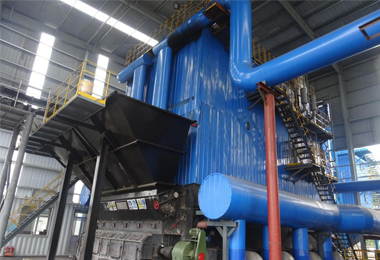
Dec . 15, 2024 04:43 Back to list
Understanding the Operating Principle of Thermal Oil Heating Systems
The Working Principle of Thermal Oil Heaters
Thermal oil heaters, also known as thermal fluid heaters, are specialized units that utilize thermal oil as a heat transfer medium instead of water or steam. These heaters are widely used in various industrial applications due to their ability to provide consistent and controllable temperatures for processes that require heating. Understanding the working principle of thermal oil heaters helps businesses and engineers to optimize their heating processes and improve energy efficiency.
Basic Components of Thermal Oil Heaters
A thermal oil heater consists of several key components a furnace, a heat exchanger, thermal oil pumps, and a control system. The furnace generates heat through the combustion of fuel (natural gas, oil, or biomass), which then heats the thermal oil circulating in the system. The heat exchanger facilitates the transfer of heat from the thermal oil to the process media, ensuring that the desired temperatures are achieved in the operational areas.
The Heating Process
The operation of a thermal oil heater begins with the fuel being fed into the combustion chamber, where it ignites and generates heat. This heat is then transferred to the thermal oil that is pumped through the system. The heating process can be broken down into several steps
1. Fuel Combustion The combustion chamber is where the fuel undergoes burning, producing hot gases. These gases rise and pass through a series of tubes that are surrounded by the thermal oil. The design of the combustion chamber and the tube system is critical as it ensures optimal heat exchange.
2. Heat Transfer As the hot gases travel through the tubes, they transfer heat to the thermal oil, raising its temperature significantly. The thermal oil is designed to withstand high temperatures without vaporizing, allowing it to retain and transfer thermal energy efficiently.
3. Circulation of Thermal Oil The heated thermal oil is pumped out of the furnace and into the heat exchanger. Here, it transfers its thermal energy to the process media, such as water or air, effectively heating it for various industrial applications.
thermal oil heater working principle

4. Cooling and Recirculation After passing through the heat exchanger, the cooled thermal oil returns to the furnace to repeat the cycle. This continuous circulation ensures that a steady supply of heated oil is maintained, allowing for precise temperature control.
Advantages of Thermal Oil Heaters
One of the primary benefits of using thermal oil as a heat transfer medium is its ability to operate at higher temperatures than water or steam systems, typically between 300°C to 400°C (572°F to 752°F) without the risk of pressure buildup. This high-temperature capability enables more efficient thermal processes, reducing energy consumption and increasing productivity.
Thermal oil heaters also offer enhanced safety features. Since thermal oil operates at atmospheric pressure, the risk of explosion or uncontrollable pressure buildup is significantly minimized compared to steam systems. Additionally, thermal oils have low volatility and are designed to prevent vaporization, ensuring that they remain in a liquid state throughout the heating process.
Applications of Thermal Oil Heaters
Due to their versatility and efficiency, thermal oil heaters are used across various industries, including
- Chemical Production Used for distillation, reaction processes, and other heat-intensive activities. - Food Processing For drying, cooking, and sterilization applications. - Plastics Industry In the production and processing of plastics, requiring precise temperature control. - Textile Industry Used in dyeing and finishing processes that require consistent heating.
Conclusion
Thermal oil heaters play a vital role in modern industrial heating systems by providing efficient, reliable, and safe heating solutions. Understanding their working principles allows for better maintenance and optimization of these systems, ultimately leading to enhanced productivity and energy efficiency. As industries continue to evolve, the role of thermal oil heaters will likely expand, reinforcing their significance in the realm of thermal management.
-
High-Efficiency Gas Thermal Oil Boilers | HPT Models
NewsJul.31,2025
-
Oil Fired Hot Water Boilers Sale - High Efficiency & Affordable
NewsJul.31,2025
-
High-Efficiency Commercial Oil Fired Steam Boiler for Industry
NewsJul.30,2025
-
High-Efficiency Biomass Fired Thermal Oil Boiler Solutions
NewsJul.30,2025
-
High Efficiency Gas Fired Thermal Oil Boiler for Industrial Heating
NewsJul.29,2025
-
High-Efficiency Gas Fired Hot Water Boiler for Sale – Reliable & Affordable
NewsJul.29,2025
Related PRODUCTS






















